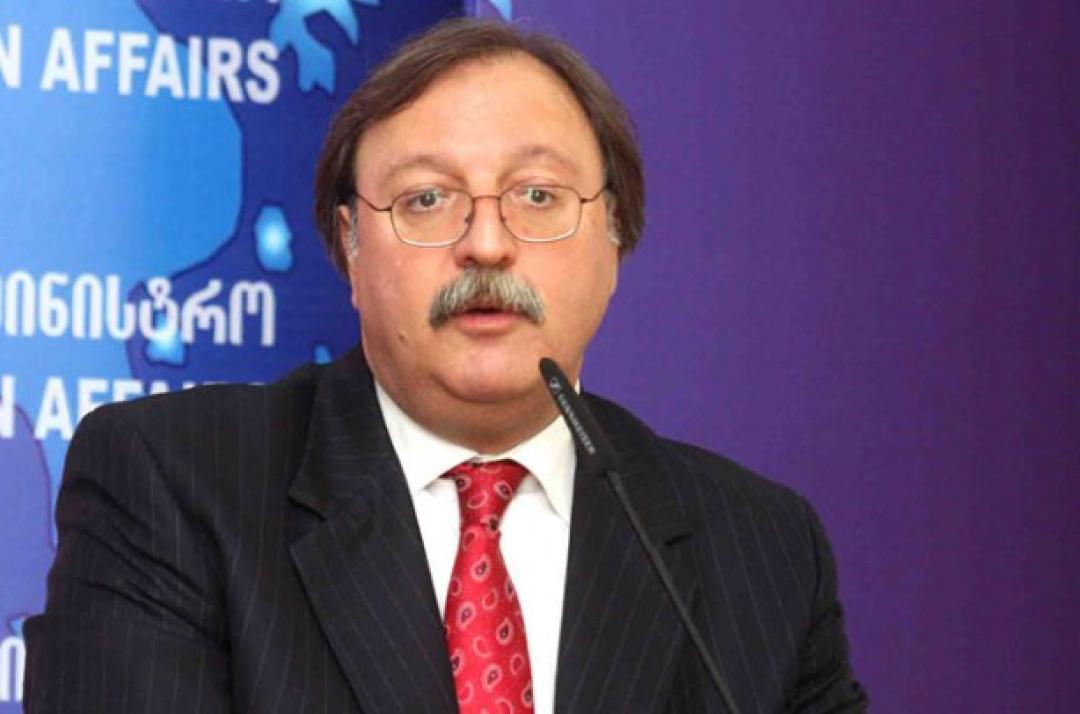
UNM leader Grigol Vashadze calls for negotiations amid continuing post-election protests in Georgia

On 10 November, the leader of the United National Movement (UNM) opposition party Grigol Vashadze has called on other opposition parties to sit at a table with the ruling Georgian Dream (GD) party to resolve election-related complications.
“Let's replace the street with a tribune of legislators of all levels,” was the main message of his address. He said that neither the government nor the opposition, despite the well-founded arguments and protests of the opposition, has the right to tolerate the development of unruly processes.
Vashadze later explained that the protests must continue, but that a political component must be added to this protest immediately - through the mediation of strategic allies in the form of negotiations on the implementation of the principles of fair elections. “Until/if the negotiations are successful, we (the UNM) will neither participate in the second round nor enter the Parliament,” Vashadze concluded.
Other opposition parties in the country, including the UNM, said that Vashadze’s statement was “unexpected and confusing.” UNM member Khatia Dekanoidze stated that it was regrettable that the party leader made the statement without the agreement of party members. Nanuka Zhorzholiani (UNM) said that “if Vashadze really wrote the statement, he must quit the post of the party leader.”
Meanwhile, the speaker of Georgia’s Parliament and member of the ruling GD party, Archil Talakvadze said that the acceptance of 31 October election results is the precondition for holding negotiations with the opposition. He added that no one will be able to enter the parliament without elections. “We (GD) have nothing to concede. The elections were held in the full line with democratic standards,” Talakvadze stated. His party colleague and Executive Secretary of GD Irakli Kobakhidze said that the opposition “has no right to raise ultimatums” and that the international community recognised the legitimacy of the elections and thus would not tolerate the opposition’s reactions.
What happened so far
On 8 November, opposition politicians and their supporters gathered in front of Georgia’s parliament building on Rustaveli Avenue and marched to the building of the Central Election Commission (CEC), demanding repeated elections to be held, the dismissal of the Chair of the CEC Tamar Zhvania and the release of all political prisoners in the country.
It was reported that thousands of protesters were confronted by the country’s riot police outside the CEC building and that the riot police deployed water cannons several times against the protesters as they began to arrive and take down fences surrounding the CEC building. It was reported that 19 individuals were detained by the police. 10 protesters and 3 media representatives were injured during the protests.
Several Georgian NGOs, including Human Rights Education and Monitoring Centre (EMC), Transparency International Georgia (TI) and International Society for Fair Elections and Democracy (ISFED) called on the Interior Ministry to not use police forces against peaceful demonstrators. All of the NGOs claimed that the police used water cannons without informing the demonstrators and started to warn them only after their previous act caused anger among the public. They also stated that in order to preserve stability in Georgia, it is important for politicians to resolve at the negotiating table the questions of recounting the ballots in the problematic precincts based on specific criteria and the fair conduct of the runoffs.
The country’s Public Defender Nino Lomjaria called the developments at the CEC “extremely unfortunate.” She also said the demonstrators were not properly warned that police were going to use water cannons, which is against the law.
The First Deputy Minister of Internal Affairs Kakha Sabanadze said that the rally “went beyond the limits established by the law on freedom of expression and peaceful assembly and developed in a violent manner.” “As protesters gathered in front of CEC building, they violently took down police steel cordons, threw stones, blunt objects and attempted to break into the Central Election Commission territory, which was foiled by police,” he said. He also denied some reports that the riot police used tear gas against demonstrators.
The CEC responded to the rally calling it pressure on the Election Administration, noting readiness to discuss any topic related to the elections peacefully with the involvement of various parties. It also noted that the processes of the 2020 parliamentary elections were not over and only the preliminary results were known. The statements also said that various legal processes were underway both in the district election commissions and in the general courts.
Georgia’s Prime Minister Giorgi Gakharia stated that processes seeking to take matters to the street must be translated onto a legal platform as soon as possible. He described the rally as “totally irresponsible,” adding that the radical part of the opposition called for disobedience. The Secretary General of the ruling Georgian Dream (GD) party Kakha Kaladze announced that GD was ready to sit down at the negotiating table with the opposition alongside international partners and resolve the issue in a civil manner.
The US Embassy and EU embassies released a joint statement following the rallies. The statement noted that a credible and inclusive legal process is needed to correct substantiated election violations. “Georgia needs a parliament able to play its role to address the immediate challenges of economic turmoil, pandemic and regional tensions, as well as to enact additional reforms to improve the country's democratic, legal and electoral processes for the future. All political sides need urgently to take responsibility for ensuring such an outcome,” the statement read.
See Also


Mirzoyan Meets US Deputy Assistant Secretary Joshua Huck

Azerbaijani President Holds Talks with UAE and German Business Delegations on Economic Cooperation

Grigoryan Confirms Armenia’s Readiness to Dissolve OSCE Minsk Group Upon Peace Treaty Signing

Azerbaijani Official Warns of Ecological Risks to Caspian Sea, Similar to Lake Urmia and Aral Sea

